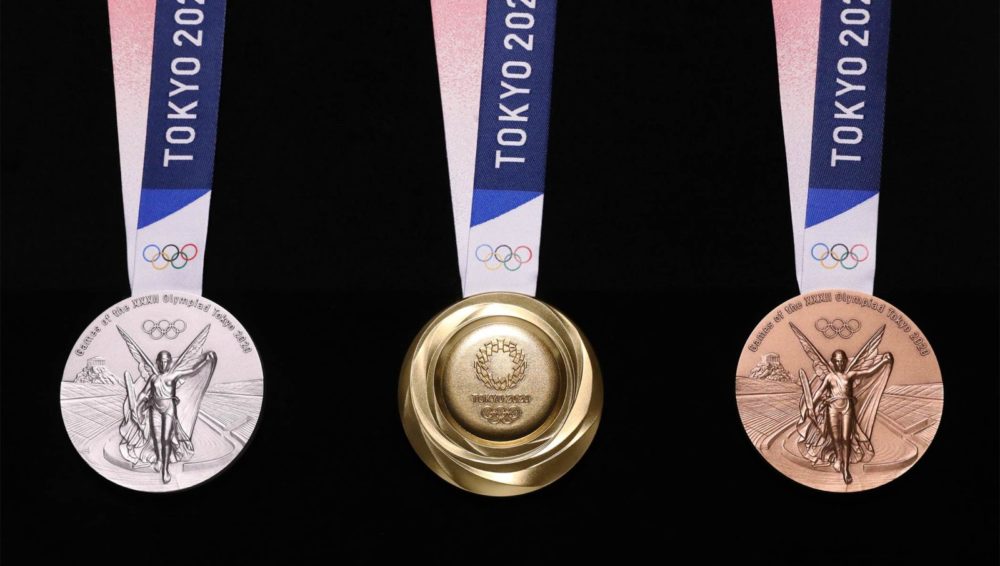With less than a year to go before the Tokyo 2020 Olympic Games in Tokyo, the Organizing Committee (TOCOG) has finally unveiled the design of the medals that will grace the necks of all 5,000 winners.
After a nationwide competition in Japan, which was open to both professional designers and design students, a specially assigned selection panel combed through more than 400 entries before deciding on the ideas presented by Junichi Kawanishi, Director of the Japan Sign Design Association and the Osaka Design Society.
According to Kawanishi, the unique design reflects patterns of light in order to symbolize the energy of the athletes and those who support them. The design also represents how athletes strive for victory on a daily basis, as well as the Olympic themes of diversity and friendship.
“It is a great honor that my design was selected for the Tokyo 2020 Olympic medal,” Kawanishi said. “I never dreamed that the design I submitted only as a memorial to this lifetime event would actually be selected. With their shining rings, I hope the medals will be seen as paying tribute to the athletes’ efforts, reflecting their glory, and symbolizing friendship.”
These medals also have something else that’s totally unique: the whole country had a hand in making them.
One Man’s Trash is Another Man’s Treasure
The International Olympic Committee (IOC) explained in a statement that each and every medal crafted for the 2020 Games will be made from metal obtained from recycled consumer electronics. These electronics have been collected over the last two years in an effort to raise awareness for the importance of e-waste recycling.
It’s all due to the recycling initiative called the Tokyo 2020 Medal Project. This was a landmark recycling initiative that ensured that each medal has been molded entirely from metal extracted from recycled consumer electronics. This was just a part of Japan’s goal of making the 2020 Olympics the “most environmentally friendly and sustainable Games so far,” according to their statement.
“A total of 78,985 tons of discarded devices were collected,” the TOGOC statement reads, “a haul which included approximately 6.21 million used mobile phones, along with digital cameras, handheld games and laptops, all of which were then classified, dismantled and melted down by highly trained contractors.”
This means that the goal of collecting 30.3kg of gold, 4,100kg of silver and 2,700kg of bronze were reached by the time the collection cycle closed on March 31, 2019.
The theme of “Be better, together – for the planet and the people” attracted donations and support from 1,300 educational institutions and 2,100 electronics retail stores across Japan.
Yellow donation boxes were placed in post offices and on street corners all over the country, and a TOCOG partner encouraged the public to donate their used phones at one of their 2,400 stores nationwide.
Building Upon Tradition
This initiative carries on a tradition seen in the 2016 Summer Olympic Games in Rio, where the silver and bronze medals were made from 30 percent recycled materials. However, the Tokyo 2020 Medal Project has been unique in its scale, marking the first time that a country’s citizens have been proactively involved in donating the electronic devices used to make the medals, in line with the Games’ Nationwide Participation Programmes.
And the sustainability effort doesn’t stop there. The medals are just one of many environmentally friendly programs being implemented by the Tokyo 2020 Organising Committee. In their statement, they also revealed that the uniforms for the upcoming Olympic Torch Relay will be partially produced with the use of recycled plastic bottles. Additionally, the victory ceremony podiums are being made from recycled household and marine plastic waste, with the committee again leaning on the Japanese public which are contributing around 45 tons of household plastic in order to create the 100 podiums for the Games.
“The organizers of the Tokyo 2020 Medal Project are hoping that this drive for a sustainable society will not end with the Olympic medals themselves,” said the IOC. “They are now calling on business owners, local authorities and the Japanese public to continue donating used household appliances, to reuse the metal for community purposes, including the creation of medals for local sports events across Japan.”
Los Angeles 2028 Summer Olympics
Los Angeles has already pledged that they plan on working towards sustainability, inclusiveness, and innovation. It may seem a long ways away but in a few years we may be tapped to do our part, following in the footsteps of Rio, Tokyo, and Paris which is hosting in 2024 and have also pledged to focus on sustainability.
But we don’t have to wait nearly a decade to do our part. Companies like Great Lakes Electronics have dedicated themselves to creating a better, more sustainable world. Make a difference today by contacting Great Lakes Electronics or call them at 888-392-7831 to get started on your electronic waste recycling journey.

